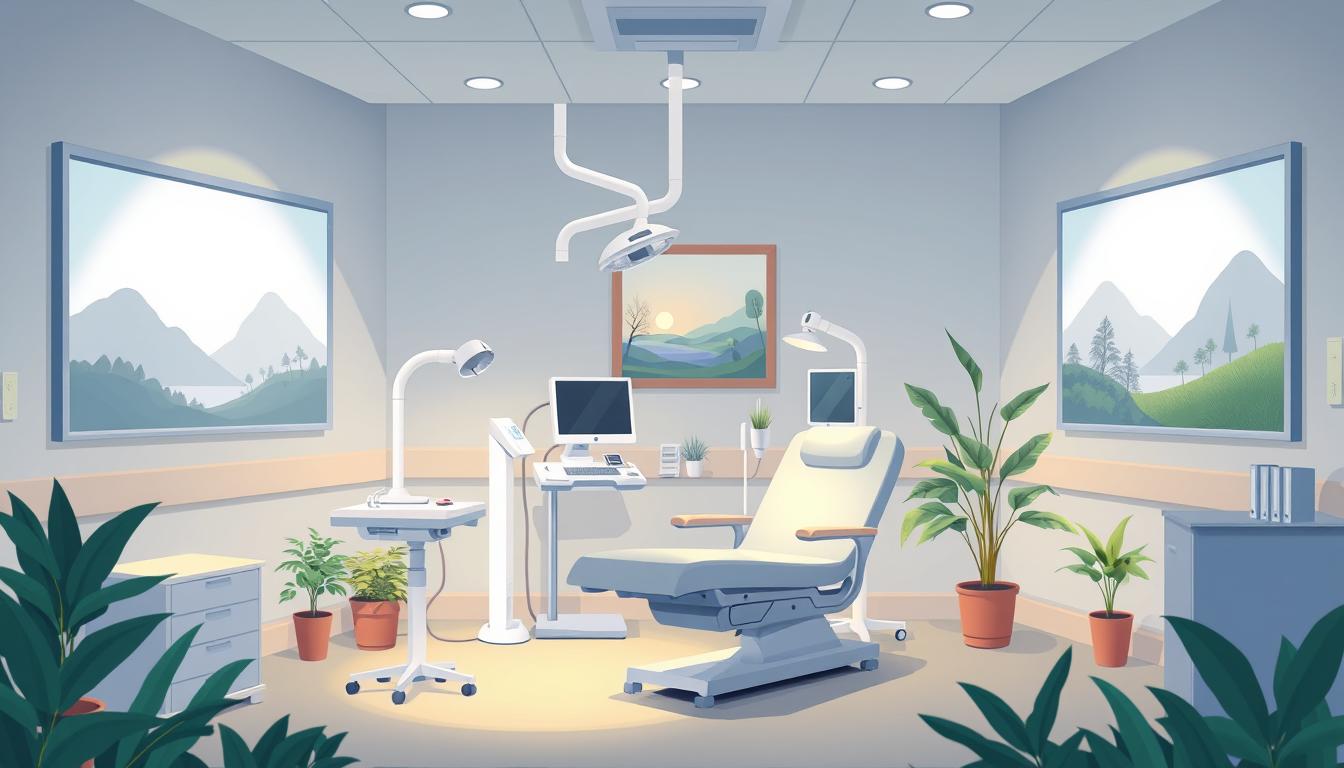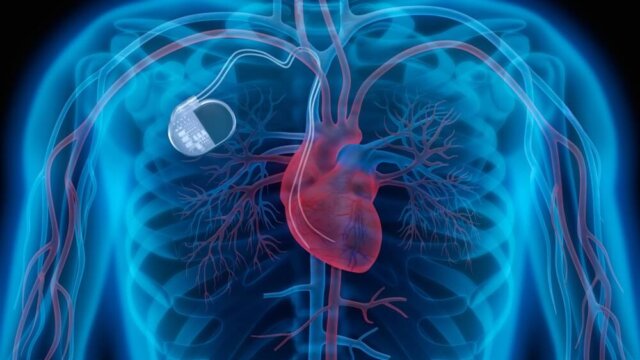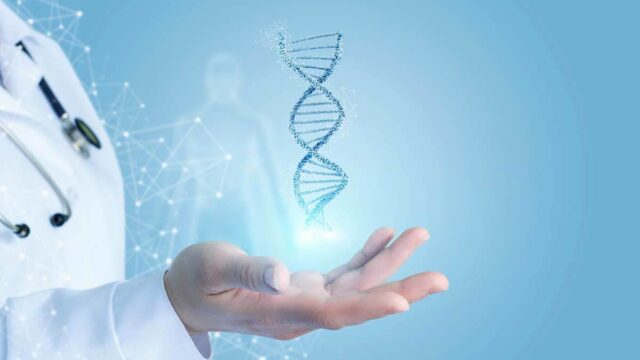FTC disclaimer: This post may contains affiliate links and we will be compensated if you click on a link and make a purchase.
Did you know that medical oncologists alone diagnose and treat over 1 million cancer patients each year in the United States? Oncology is a key field in fighting cancer. It helps improve life quality for those with this disease. Oncologists and their team work hard to find new ways to fight cancer.
Key Takeaways
- Oncology covers research, diagnosis, and treatment of cancer in many areas.
- Oncologists and their team help patients through their cancer journey.
- Early detection and tailored treatments are key to better cancer outcomes.
- New therapies like targeted and immunotherapy are changing cancer care.
- Support services, from palliative care to survivorship programs, are vital for managing cancer.
What is Oncology?
Oncology Definition and Scope
Oncology is the study, diagnosis, and treatment of cancer. It comes from the Greek word “onkos” meaning tumor or mass. Oncology includes research, early detection, diagnosis, treatment, and care for survivors.
It covers many cancer types and specialties. This includes blood cancers and cancers of specific organs like the breast and gynecological areas.
Importance of Oncology in Cancer Care
Oncology is key in cancer care. Oncologists and teams work together for personalized treatment. They diagnose, plan treatments, and monitor patients’ progress.
Their knowledge is vital for better cancer outcomes and quality of life.

“Oncology is the medical specialty focused on the study, diagnosis, and treatment of cancer.”
Oncology Specialties | Focus Areas |
|---|---|
Surgical Oncology | Treating cancer through surgery and biopsies |
Medical Oncology | Utilizing chemotherapy, immunotherapy, and targeted therapy to treat cancer |
Radiation Oncology | Treating cancer using radiation therapy |
Geriatric Oncology | Providing cancer care for individuals aged 65 and older |
Gynecologic Oncology | Focusing on cancers in reproductive organs like the cervix, ovaries, and uterus |
Neuro-Oncology | Treating cancers of the brain, spine, and nervous system |
Pediatric Oncology | Specializing in treating cancer in children and teens |
Thoracic Oncology | Treating cancers in the chest area, including the lungs and esophagus |
Urologic Oncology | Addressing cancers in the genitourinary system, such as bladder and prostate cancers |
Oncologists work from diagnosis to follow-up. They team up with nurses, radiologists, and others for complete care.
Cancer Care Team
When you get a cancer diagnosis, you need a team of experts. This cancer care team has many specialists. Each one is important for your care.
Roles of Different Healthcare Professionals
Oncologists lead the team. They know a lot about cancer. They work with surgeons, radiation therapists, and others to give you the best care.
Nurses are key. They take care of you, give treatments, and help you understand your treatment. They also support you emotionally. Nurse practitioners help with your primary care too.
There are also pathologists, radiologists, and genetic specialists. They help figure out what kind of cancer you have and how far it has spread.
Genetic counselors, nutritionists, and social workers help with your physical and emotional needs. They are part of the supportive care team.
Oncologists and Their Specialties
Oncologists lead the team and specialize in different areas. Medical oncologists use treatments like chemotherapy. Surgical oncologists do surgeries. Radiation oncologists use radiation to treat cancer.
Some oncologists focus on specific cancers, like breast or blood cancers. Others work with certain groups, like kids or older adults.
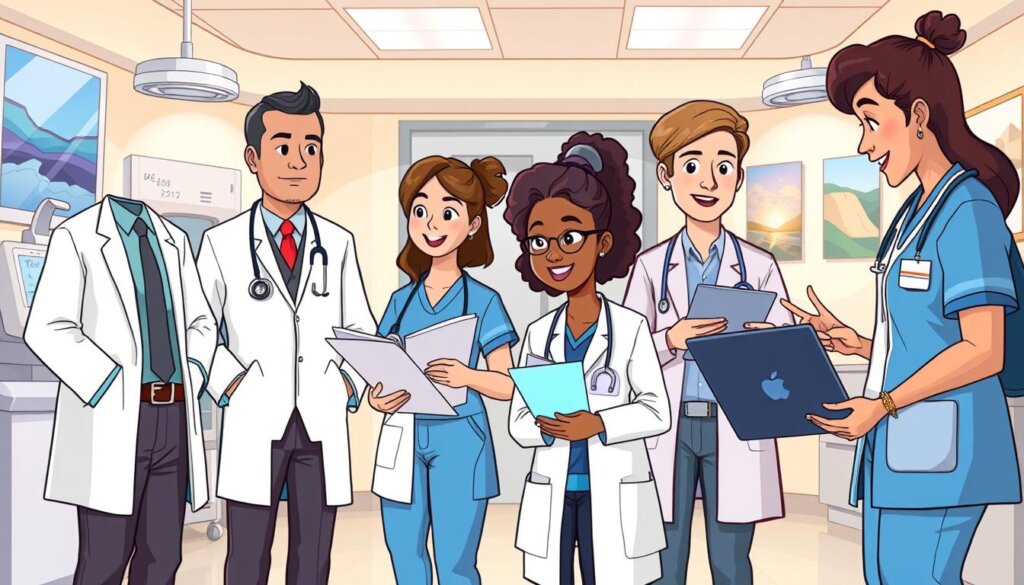
“The cancer care team is instrumental in providing comprehensive, personalized care for patients throughout their cancer journey.”
Oncology: Diagnosing Cancer
Diagnosing cancer is key in oncology care. Oncologists use many tools to find cancer, know its type, and its stage. They use physical exams, lab tests, tumor markers, imaging scans, and biopsies.
Labcorp Oncology offers tests for cancer screening and planning. These include tests for genes, immune markers, and tumor markers.
Scans like CT and MRI help see tumors and cancer spread. Biopsies are vital for confirming cancer.
Diagnostic Test | Purpose |
|---|---|
Cytogenetic Analysis | Looks for changes in chromosomes to diagnose cancer or plan treatment |
Immunophenotyping | Helps diagnose and monitor blood cancers like leukemias and lymphomas |
Liquid Biopsy | Detects cancer cells early, aids in treatment planning and monitoring |
Tumor Marker Tests | Measure substances produced by cancer cells, assisting in diagnosis, treatment decisions, and monitoring |
Early cancer diagnosis is key for better treatment chances. Oncologists work with a team for a detailed plan.
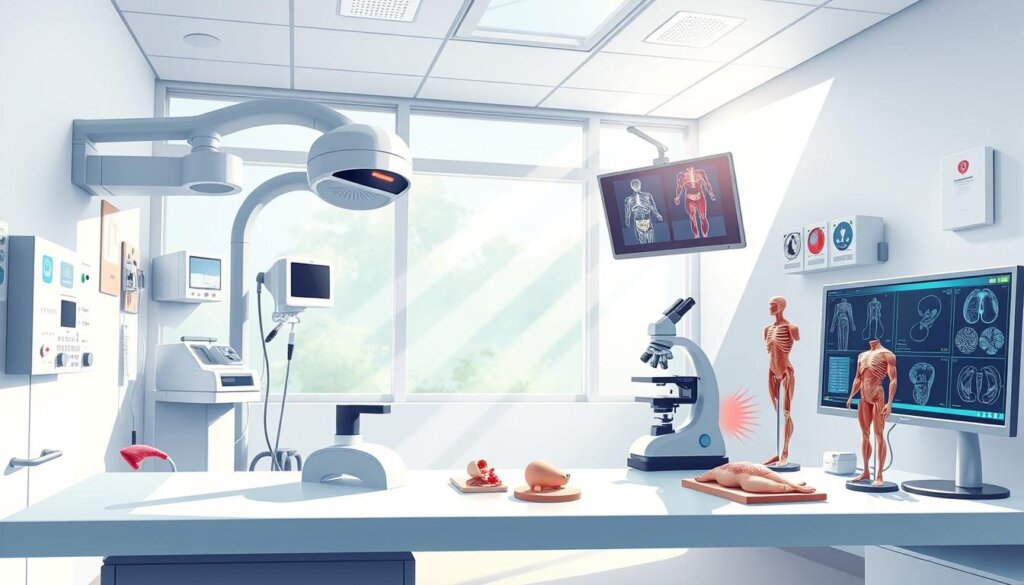
Oncologists use many tools to find cancer’s type and stage. This helps in making a good treatment plan.
Cancer Treatment Options
Oncologists have many ways to treat cancer. They use surgery, chemotherapy, and new treatments like targeted and immunotherapies. The field of oncology has grown a lot in recent years.
Surgery for Cancer Treatment
Surgery is often the first step against solid tumors or affected lymph nodes. It aims to remove the cancer from the body.
Chemotherapy and Radiation Therapy
Chemotherapy and radiation therapy are common treatments. Chemotherapy kills cancer cells with strong medicines. Radiation therapy uses energy to damage and kill cancer cells. These treatments can be used alone or together, based on the patient’s needs.
Targeted Therapy and Immunotherapy
Targeted therapies and immunotherapies are more personal. Targeted therapies use drugs to target cancer cells with fewer side effects. Immunotherapies use the body’s immune system to fight cancer.

“The goal of cancer treatment is to cure or shrink cancer. It aims to stop cancer from spreading.”
Cancer Treatment | Description |
|---|---|
Surgery | Physically removes cancer from the body |
Chemotherapy | Uses drugs to kill rapidly dividing cancer cells |
Radiation Therapy | Uses high-energy particles or waves to destroy cancer cells |
Targeted Therapy | Targets specific molecular changes in cancer cells |
Immunotherapy | Boosts the immune system to fight cancer |
Cancer treatment options have grown a lot in recent years. This offers patients more personal and effective ways to manage their disease. By knowing the different treatments, people can work with their oncology team. Together, they can create a care plan that meets the patient’s needs and goals.
Choosing a Cancer Treatment Center
Choosing the right cancer treatment center is very important. The care you get can greatly affect your treatment and how you feel. There are important things to think about when you look for a place.
Factors to Consider
The team’s reputation and skills are key. Look for a center linked to the National Cancer Institute (NCI). These places lead in cancer research and offer new treatments and trials. The Association of American Cancer Institutes (AACI) also has a list of top cancer centers in the U.S. and Canada.
It’s also important to find a center that cares about you. Look for a place that listens to you, offers support, and makes sure you have a good experience. The American College of Surgeons’ National Accreditation Program for Breast Centers and the Commission on Cancer (CoC) show a center’s dedication to quality care.
Seeking a Second Opinion
Getting a second opinion is very helpful. Doctors usually support this idea because it can confirm or change treatment plans. Many insurance plans cover this, so it’s worth considering.
Your choice of cancer treatment center is very important. Take time to research and think about what matters to you. Don’t be afraid to ask for a second opinion. Your health is worth it.
“Choosing the right cancer treatment center is one of the most important decisions you’ll make. It can make a world of difference in your care and outcomes.”
Clinical Trials in Oncology
Clinical trials are key in cancer research. They test new treatments and therapies. Patients can get the latest care, but there are risks to think about.
Benefits and Risks
Oncologists help patients understand the benefits and risks of trials. Trials offer new treatments that might work better than usual care. For example, some immunotherapies can cure cancers thought to be incurable.
Doctors also learn how to handle side effects of new treatments. But, trials can have risks like unknown side effects or getting a placebo. Still, most trials offer real treatments, and using placebos is rare.
Choosing to join a trial is a personal decision. Oncologists give patients all the facts to help them decide.
Potential Benefits of Clinical Trials | Potential Risks of Clinical Trials |
|---|---|
|
|
Even with risks, trials are vital for cancer research and care. Patients can help find better treatments and maybe even get better care themselves.
Palliative Care and Support Services
Oncology teams focus on more than just treating cancer. They also care for the physical, emotional, and social needs of patients and their families. Palliative care and support services are key parts of this care. They help improve life quality, ease symptoms, and offer support at every stage, including the end of life.
Palliative care brings together many healthcare experts. They work together to manage symptoms and focus on the patient’s needs. Studies show it can make life better and even help people live longer in some cases.
Oncology nurses are very important in palliative care. They help with physical and emotional needs, and they also handle legal and ethical issues. The Oncology Nursing Society says all cancer patients should get palliative care from the start to the end of their journey.
Healthcare systems should make advance care planning a priority. This way, they can respect patients’ wishes and values. It’s also important to train healthcare workers and for oncology nurses to share accurate information.
Many groups, like the American Society of Clinical Oncology (ASCO), are working to make palliative care part of standard care. They offer resources and guidelines to help healthcare teams give the best care possible.
“Palliative care is not just for the end of life. It can be beneficial for patients at any stage of a serious illness, including cancer. By addressing the various needs of patients and their families, palliative care can improve quality of life and even potentially extend survival in some cases.”
Oncology: Survivorship and Follow-up Care
After primary cancer treatment, patients start a new phase called cancer survivorship. Oncology helps these survivors with care and support. They make sure survivors get the right follow-up care to watch for side effects, prevent cancer from coming back, and keep a good quality of life.
Survivorship care plans are made just for each person. They look at the person’s cancer and treatment history. These plans list what medical care is needed, when to get check-ups and tests, possible long-term side effects, and how to lower the chance of cancer coming back or getting a new cancer.
Seeing doctors regularly is key for cancer survivors. They usually see their doctors every 3 to 4 months in the first 2 to 3 years after treatment. Then, they see them once or twice a year. These visits include checking symptoms, physical exams, and tests based on their treatment.
Survivorship clinics at cancer centers and hospitals give full follow-up care. Groups like the Children’s Oncology Group and the National Comprehensive Cancer Network offer guidelines and resources for survivors.
Oncology professionals work to meet the physical, emotional, and psychosocial needs of survivors. They aim to improve outcomes, prevent cancer from coming back, and help survivors live well after cancer.
Key Aspects of Cancer Survivorship Care | Description |
|---|---|
Monitoring for Recurrence | Regular check-ups and tests to detect any potential cancer recurrence or the development of a second cancer. |
Managing Long-Term Side Effects | Addressing physical, emotional, and psychosocial challenges that may arise due to cancer treatment. |
Promoting Healthy Lifestyle | Providing guidance on nutrition, physical activity, and other lifestyle factors to support overall well-being. |
Coordinating Care | Ensuring seamless communication and collaboration between the patient, oncologists, and other healthcare providers. |
“Cancer survivorship is a critical phase of the cancer journey, and oncology professionals play a vital role in supporting patients through this transition and beyond.” – Dr. Sarah Johnson, Oncology Specialist
Oncology focuses on survivorship and follow-up care. This ensures that those who have beaten cancer can keep thriving and enjoy a good quality of life.
Conclusion
Oncology is key in the battle against cancer. It aims to cure, extend life, and improve quality of life. Thanks to research and new treatments, oncologists work hard to help patients.
Early detection is very important. It helps find cancer when it’s easier to treat. Palliative care helps those with advanced cancer feel better, even if they can’t be cured.
Oncology teams work together to give the best care. They use their skills to help patients. This teamwork is crucial for success.
The fight against cancer is ongoing. New research and treatments bring hope. By working together, the oncology community aims to improve care for all.
FAQ
What is oncology?
Oncology is the study and treatment of cancer. It includes finding causes, making new treatments, and helping patients.
What is the role of oncologists in cancer care?
Oncologists are doctors who focus on cancer. They help patients from start to finish, guiding them through treatment.
Who is part of the cancer care team?
The team includes doctors, nurses, and more. Each one is important for patient care.
How do oncologists diagnose cancer?
Doctors use many tools to find cancer. This includes exams, tests, and scans to know the type and stage.
What are the main cancer treatment options?
Treatments include surgery, chemo, and more. Each one is chosen based on the patient’s needs.
How can patients choose the best cancer treatment center?
Look at the center’s reputation and team. Also, check for new treatments and quality of care.
What are the benefits and risks of participating in clinical trials?
Trials offer new treatments but have risks. Doctors help patients decide if it’s right for them.
How does oncology address the needs of cancer survivors?
Care for survivors includes watching for side effects and helping them stay healthy. It also covers emotional and mental health.
